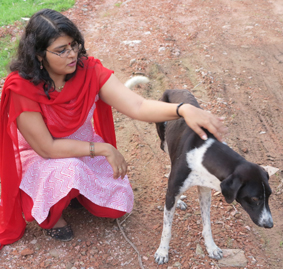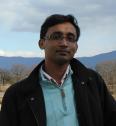This time Scientific Bangladesh has talked with Dr Anindita Bhadra. She is the founding and present chairperson of Indian National Young Academy of Science (INYAS). She is also a member of Global Young Academy. She is a Zoologist with a research interest in Animal behaviour and cognition, Evolutionary biology, Behavioural Psychology, Social behaviour, Infant cognition. Her other interests include Literature, Theatre, Dance, Creative writing, Art, Photography, Travel, Science education.
She is also the mother of two young children and professional theatre artist.
Scientific Bangladesh: Would you like to tell us about your academic and research life including any awards you won?
Dr Anindita: Academically I am a zoologist. Obtained Bachelor of Science (BSc), 1999, from Calcutta University, Kolkata, India. Passed in first class with Honours in Zoology, Master of Science (MSc), 2001 from the Calcutta University, Kolkata, India, in Zoology with specialization in Genetics. Passed in first-class and Doctor of Philosophy (PhD), 2008 from the Indian Institute of Science, Bangalore, India. Thesis title: “Queens and their successors: The story of power in the primitively eusocial was Ropalidia marginata”.
Some of the awards obtained are listed below:
K. S. Rao Memorial Award from Vivekananda College, Kolkata for holding the first rank in the Department of Zoology of the college in the B.Sc examination, November 1999.
Junior Research Fellowship from the Council of Industrial and Scientific Research (CSIR), Govt. of India, January 2002.
Senior Research Fellowship from the Council of Industrial and Scientific Research (CSIR), Govt. of India, January 2005
INSA medal for the young scientist in Animal Sciences, 2009.
Featured among 10 Indian scientists of the decade selected by The Telegraph, India (1st January 2010).
SERB Women Excellence Award, 2013, awarded by SERB, DST, Govt. of India.
Selected as IAP Young Scientist 2015.
Scientific Bangladesh: What has made you a researcher?
Dr Anindita: I have always wanted to be a teacher. When I was in high school (XI and XII), I used to go to Dr Aniruddha Mukherjee for private tuitions in Biology. He was a college teacher, and he told us about some of the big institutes of India, where one could do a PhD. Till then I had never thought of doing research, but his stories about a friend of his, who had done his PhD at IISc Bangalore, the best institute in India, inspired me. During my BSc, this very friend of my teacher, Dr Silanjan Bhattacharyya, joined or college. He was like a breath of fresh air in the department, who tried to inspire us with stories from his PhD and postdoctoral days. He organized our field trip in the Western Ghats, which was a first for our college. On the way, he arranged for us to spend a day at the Centre for Ecological Sciences, IISc, Bangalore. There we visited labs and listened to talks by some senior PhD students and by the two best and senior-most faculty members of the department, Prof. Madhav Gadgil and Prof Raghavendra Gadagkar. That day changed my life, as I fell in love with IISc at first sight, and told myself that I wanted to go back there, as a student. Prof. Gadagkar’s talk was an experience which left us all awestruck. I remember having asked a lot of questions, all of which were answered patiently and enthusiastically. I came back, determined to do a PhD with Prof. Gadagkar, in IISc.
Scientific Bangladesh: How do you manage the fund for research?
Dr Anindita: I have been supported by extramural funds from the various government agencies since the beginning of my independent research career. My research is inexpensive, and the most expensive component in my funding proposals in manpower. So I have not faced any issues with research funding until recently. Currently, we are facing a lot of issues regarding funding in India, and I am no exception. Many researchers are facing the brunt of fund cuts in basic research. I have a sanctioned project, but no funds yet, and this is the situation that most people are having to put up with.
Scientific Bangladesh: Where does a major part of your research fund come from, home or abroad?
Dr Anindita: Home. I have no international funding.
Scientific Bangladesh: Inadequate fund for research is a major problem the majority of countries. What would you say in response to pointing fingers by many to this basic problem worldwide?
Dr Anindita: This is a very real problem across the world. In India, only about 0.8% of the GDP goes into research, and that is minuscule, compared to most developed nations. In recent years, there has been a surge of funding in applied research, but the problem is that applied research alone cannot flourish. We need basic research and applied research to run together, but this is not something that funding agencies seem to understand. All said and done, my research is not expensive, and I can sustain on small funds.
Scientific Bangladesh: What is your research area? What type of research facilities/ infrastructures you have developed over the years in your laboratory and how?
Dr Anindita: I am a behavioural biologist. I work on the behavioural ecology of free-ranging dogs in India. My research group studies dogs on streets, and we cover aspects of their social behaviour, ecology and cognition. My laboratory is really in the streets, and my students are well trained in carrying out behavioural observations and performing statistical analysis to understand their data.
Scientific Bangladesh: How many researchers (PhDs and Masters) have you developed by this time? What qualities do you focus to develop in the researchers who work with you?
Dr Anindita: One student has finished her PhD from my lab, and there are three more working with me at present. I have supervised 10 master’s theses and numerous students have carried out short term projects in my lab. I try to teach my students to think logically and ask questions. They are taught not to take anything at face value and I help them to develop an attitude of reasoning, which is essential for doing science. Each of them is capable of designing experiments and carrying out analysis of their data, and have to go through the process of writing their papers and theses. They are encouraged to act as teaching assistants and to train junior students, which helps them to develop teaching and leadership skills.
Scientific Bangladesh: If the government had asked for your suggestions/advice for scientific advancement of your country, what would be three pieces of advice you would make as a researcher?
Dr Anindita: 1. Increase funding in education, and give attractive salaries to teachers, so that more and more bright students are encouraged to take up the profession. 2. Increase funding in basic research and give freedom to scientists to choose their research questions. 3. Encourage the scientists to communicate their research findings to the public by interacting with the media, and encourage science journalism.
Scientific Bangladesh: What are the advantages and disadvantages/difficulties of being a woman researcher/scientist?
Dr Anindita: A woman often faces discrimination in society, often at very subtle levels, and scientists are no different. I have been denied promotions when colleagues with less on the CVs have been promoted. I have been told that I have a family to care for, and being a woman, I should not be worried about a career in science. I have been considered as a bad mother for travelling, leaving small children at home. However, that is only one facet of society. Being a woman, of course, has some issues associated with biology. I have been very lucky to have very supportive family members, and especially privileged to have a PhD supervisor who provided me with all support when I had my son during my PhD. However, I know many women who have not been so lucky. I often see my women colleagues struggling to balance their lives between the lab and the home, while their husbands can concentrate only on their labs. I have seen young students being abused by their male supervisors. Sometimes women speak up, but they often put up with all of this because of the social stigma associated with abuse. The academia is, after all, a representation of the society, and we have all the shades of society represented among us.
Scientific Bangladesh: What’s your suggestion for women graduates who want to be a researcher?
Dr Anindita: Don’t stop at anything because you are a woman. Go and live your dream, and speak out against injustice. Don’t put up with discrimination at any cost.
Scientific Bangladesh: Do you think different professional bodies of scientists playing their due role? What are your suggestions for the leading professional organizations of scientists?
Dr Anindita: I think we have a long way to go. Scientists often tend to stay away from social issues and prefer not to get involved in anything that might be considered political. This is not fair. We do our research with public funding, and we owe it to society to get involved in matters that affect society. The scientific bodies, of course, come out with white papers and statements on various issues from time to time, but we need more engagement between science and society.
Scientific Bangladesh: How important leadership ability for someone to be a good researcher?
Dr Anindita: Yes, I think, in order to be a good researcher, one needs to have good leadership skills, because a researcher typically has to work with many people. We need to understand how to handle our students, our colleagues, members of the administration, and good leadership skills are important in this regard. A good leader can inspire others, and can thus set an example for future generations of students.
Scientific Bangladesh: Have we missed any point that you would like to share with our readers?
Dr Anindita: My experience is that most people lack a scientific way of mind. I have seen many scientists who practice science just as a profession, and not as a way of life. They have superstitions and religious biases like any other member of society. As a scientist, I strongly feel one needs to practice science as a way of life and inculcate this spirit in others. If people practice logical reasoning and rationality in their day to day lives, that itself can help to reduce many of the issues like religious strife and intolerance, poor health and hygiene, superstitious practices, that bog down humanity across the world today.
Scientific Bangladesh: Thanks for your time.
Dr Anindita: My pleasure ……………


